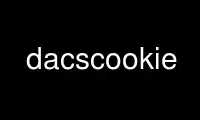
This is the command dacscookie that can be run in the OnWorks free hosting provider using one of our multiple free online workstations such as Ubuntu Online, Fedora Online, Windows online emulator or MAC OS online emulator
PROGRAM:
NAME
dacscookie - create DACS credentials and emit as a cookie
SYNOPSIS
dacscookie [dacsoptions[1]] [-create] [-i ident] [-user user] [-ip ipaddr]
[-role role_str] [-expires date] [-ua str]
dacscookie [dacsoptions[1]] -decrypt [-concise]
DESCRIPTION
This program is part of the DACS suite.
The dacscookie utility constructs DACS credentials that represent a single DACS identity
and emits them as the NAME=VALUE element of a HTTP cookie[2] (RFC 2109[3], RFC 2965[4])
that may be used by DACS. It can also decode and display these cookies, provided the same
encryption keys used to create the cookies are available. The program is useful for
testing purposes, or by programs that perform authentication (e.g., by calling
dacsauth(1)[5]) and need to return credentials. It may also be used to generate an
identity "offline"; the resulting credentials could be used by applications other than
standard Web browsers, or be distributed via any secure channel (e.g., encrypted email)
for use by the recipient.
Configured or derived defaults are used if optional identity information is not provided.
Security
Only the DACS administrator should be able to successfully run this program. Because
DACS keys and configuration files must be limited to the administrator, this will
normally be the case, but a careful administrator will set file permissions to deny
access to all other users, or even delete the binary.
Similarly, access to cookies generated by this program must be carefully controlled.
Any jurisdiction within the same federation in which the credentials were created will
be able to directly decrypt the credentials.
OPTIONS
dacscookie recognizes these options for cookie creation:
-create
Create the specified credentials and emit them to the standard output as the
NAME=VALUE component of an HTTP cookie. This is the default.
-expires date
Set the expiry date for the cookie. If date begins with '+' and is followed by a digit
string, the expiry date will be that number of seconds relative to the current time.
Otherwise, the date is expected to be in one of the recognized formats (see concise
syntax[6]). If not provided, the configured default value,
AUTH_CREDENTIALS_DEFAULT_LIFETIME_SECS[7], will be used.
-i ident
The identity (ident) is given in the concise syntax[6]. Note that any elements that
are explicitly given will override those that appear in ident.
-ip ipaddr
Use ipaddr as the user's IP address (in numerical dot notation). If not provided, this
element will be obtained from any -i flag or else omitted from the credentials.
-role role_str
Use role_str as the user's role string, which must be syntactically correct. If not
provided, this element will be obtained from any -i flag or else omitted from the
credentials.
-ua str
Use str as the user agent string associated with the credentials. If no string is
specified, the credentials cannot be verified against a user agent string. See
dacs.conf(5)[8].
-user name
Use name, a syntactically correct username, within the applicable jurisdiction. If not
provided, this element must be specified using the -i flag.
dacscookie recognizes these options for cookie decryption:
-decrypt
Instead of creating credentials, read a cookie from the standard input and print its
decoded contents to the standard output. If the input is invalid in any way, a message
is displayed.
-concise
With the -decrypt flag, only print the identity in the concise user syntax[6].
EXAMPLES
The following will generate an identity and store it in a file:
% dacscookie -u j1.example.com -user bobo > cookie.out
% chmod 0600 cookie.out
The following will display various elements of the credentials to stdout:
% dacscookie -u j1.example.com -decrypt < cookie.out
% rm cookie.out
DIAGNOSTICS
The program exits 0 if everything was fine, 1 if an error occurred.
Use dacscookie online using onworks.net services
